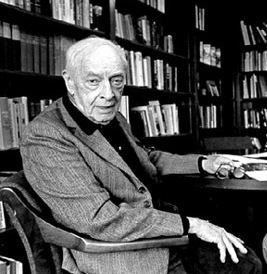Bellow, Saul: Henderson the Rain King (detail)
Henderson the Rain King (detail) (English)I What made me take this trip to Africa? There is no quick explanation. Things got worse and worse and worse and pretty soon they were too complicated. When I think of my condition at the age of fifty-five when I bought the ticket, all is grief. The facts begin to crowd me and soon I get a pressure in the chest. A disorderly rush begins-my parents, my wives, my girls, my children, my farm, my animals, my habits, my money, my music lessons, my drunkenness, my prejudices, my brutality, my teeth, my face, my soul! I have to cry,“No, no, get back, curse you, let me alone!” But how can they let me alone? They belong to me. They are mine. And they pile into me from all sides. It turns into chaos. However, the world which I thought so mighty an oppressor has removed its wrath from me. But if I am to make sense to you people and explain why I went to Africa I must face up to the facts. I might as well start with the money. I am rich. From my old man I inherited three million dollars after taxes, but I thought myself a bum and had my reasons, the main reason being that I behaved like a bum. But privately when things got very bad I often looked into books to see whether I could find some helpful words, and one day I read,“The forgiveness of sins is perpetual and righteousness first is not required.” This impressed me so deeply that I went around saying it to myself. But then I forgot which book it was. It was one of thousands left by my father, who had also written a number of them. And I searched through dozens of volumes but all that turned up was money, for my father had used currency for bookmarks-whatever he happened to have in his pockets-fives, tens, or twenties. Some of the discontinued bills of thirty years ago turned up, the big yellowbacks. For old times’ sake I was glad to see them and locking the library door to keep out the children I spent the afternoon on a ladder shaking out books and the money spun to the floor. But I never found that statement about forgiveness. Next order of business: I am a graduate of an Ivy League university-I see no reason to embarrass my alma mater by naming her. If I hadn’t been a Henderson and my father’s son, they would have thrown me out. At birth I weighed fourteen pounds, and it was a tough delivery. Then I grew up. Six feet four inches tall. Two hundred and thirty pounds. An enormous head, rugged, with hair like Persian lambs’ fur. Suspicious eyes, usually narrowed. Blustering ways. A great nose. I was one of three children and the only survivor. It took all my father’s charity to forgive me and I don’t think he ever made it altogether. When it came time to marry I tried to please him and chose a girl of our own social class. A remarkable person, handsome, tall, elegant, sinewy, with long arms and golden hair, private, fertile, and quiet. None of her family can quarrel with me if I add that she is a schizophrenic, for she certainly is that. I, too, am considered crazy, and with good reason-moody, rough, tyrannical, and probably mad. To go by the ages of the kids, we were married for about twenty years. There are Edward, Ricey, Alice, and two more-Christ, I’ve got plenty of children. God bless the whole bunch of them. In my own way I worked very hard. Violent suffering is labor, and often I was drunk before lunch. Soon after I came back from the war (I was too old for combat duty but nothing could keep me from it; I went down to Washington and pressured people until I was allowed to join the fight), Frances and I were divorced. This happened after V-E Day. Or was it so soon? No, it must have been in 1948. Anyway, she’s now in Switzerland and has one of our kids with her. What she wants with a child I can’t tell you, but she has one, and that’s all right. I wish her well. I was delighted with the divorce. It offered me a new start in life. I had a new wife already picked out and we were soon married. My second wife is called Lily (maiden name, Simmons). We have twin boys. Now I feel the disorderly rush-I gave Lily a terrible time, worse than Frances. Frances was withdrawn, which protected her, but Lily caught it. Maybe a change for the better threw me; I was adjusted to a bad life. Whenever Frances didn’t like what I was doing, and that was often, she turned away from me. She was like Shelley’s moon, wandering companionless. Not so Lily; and I raved at her in public and swore at her in private. I got into brawls in the country saloons near my farm and the troopers locked me up. I offered to take them all on, and they would have worked me over if I hadn’t been so prominent in the county. Lily came and bailed me out. Then I had a fight with the vet over one of my pigs, and another with the driver of a snowplow on US 7 when he tried to force me off the road. Then about two years ago I fell off a tractor while drunk and ran myself over and broke my leg. For months I was on crutches, hitting everyone who crossed my path, man or beast, and giving Lily hell. With the bulk of a football player and the color of a gipsy, swearing and crying out and showing my teeth and shaking my head-no wonder people got out of my way. But this wasn’t all. Lily is, for instance, entertaining ladies and I come in with my filthy plaster cast, in sweat socks; I am wearing a red velvet dressing gown which I bought at Sulka’s in Paris in a mood of celebration when Frances said she wanted a divorce. In addition I have on a red wool hunting cap. And I wipe my nose and mustache on my fingers and then shake hands with the guests, saying, “I’m Mr. Henderson, how do you do?” And I go to Lily and shake her hand, too, as if she were merely another lady guest, a stranger like the rest. And I say, “How do you do?” I imagine the ladies are telling themselves, “He doesn’t know her. In his mind he’s still married to the first. Isn’t that awful?” This imaginary fidelity thrills them. But they are all wrong. As Lily knows, it was done on purpose, and when we’re alone she cries out to me, “Gene, what’s the big idea? What are you trying to do?” All belted up with the red braid cord, I stand up to her in my velvet bathrobe, sticking out behind, and the foot-shaped cast scraping hard on the floor, and I wag my head and say,“Tchu-tchu-tchu!” Because when I was brought home from the hospital in this same bloody heavy cast, I heard her saying on the telephone,“It was just another one of his accidents. He has them all the time but oh, he’s so strong. He’s unkillable.” Unkillable! How do you like that! It made me very bitter. Now maybe Lily said this jokingly. She loves to joke on the telephone. She is a large, lively woman. Her face is sweet, and her character mostly is consistent with it. We’ve had some pretty good times, too. And, come to think of it, some of the very best occurred during her pregnancy, when it was far advanced. Before we went to sleep, I would rub her belly with baby oil to counteract the stretch marks. Her nipples had turned from pink to glowing brown, and the children moved inside her belly and changed the round shape. I rubbed lightly and with greatest care lest my big thick fingers do the slightest harm. And then before I put out the light I wiped my fingers on my hair and Lily and I kissed good night, and in the scent of the baby oil we went to sleep. But later we were at war again, and when I heard her say I was unkillable I put an antagonistic interpretation on it, even though I knew better. No, I treated her like a stranger before the guests because I didn’t like to see her behave and carry on like the lady of the house; because I, the sole heir of this famous name and estate, am a bum, and she is not a lady but merely my wife-merely my wife. As the winters seemed to make me worse, she decided that we should go to a resort hotel on the Gulf, where I could do some fishing. A thoughtful friend had given each of the little twins a slingshot made of plywood, and one of these slingshots I found in my suitcase as I was unpacking, and I took to shooting with it. I gave up fishing and sat on the beach shooting stones at bottles. So that people might say,“Do you see that great big fellow with the enormous nose and the mustache? Well, his great-grandfather was Secretary of State, his great-uncles were ambassadors to England and France, and his father was the famous scholar Willard Henderson who wrote that book on the Albigensians, a friend of William James and Henry Adams.” Didn’t they say this? You bet they did. There I was at that resort with my sweet-faced anxious second wife who was only a little under six feet herself, and our twin boys. In the dining room I was putting bourbon in my morning coffee from a big flask and on the beach I was smashing bottles. The guests complained to the manager about the broken glass and the manager took it up with Lily; me they weren’t willing to confront. An elegant establishment, they accept no Jews, and then they get me, E. H. Henderson. The other kids stopped playing with our twins, while the wives avoided Lily. Lily tried to reason with me. We were in our suite, and I was in swimming trunks, and she opened the discussion on the slingshot and the broken glass and my attitude toward the other guests. Now Lily is a very intelligent woman. She doesn’t scold, but she does moralize; she is very much given to this, and when it happens she turns white and starts to speak under her breath. The reason is not that she is afraid of me, but that it starts some crisis in her own mind. But as it got her nowhere to discuss it with me she started to cry, and when I saw tears I lost my head and yelled,“I’m going to blow my brains out! I’m shooting myself. I didn’t forget to pack the pistol. I’ve got it on me now.” “Oh, Gene!” she cried, and covered up her face and ran away. I’ll tell you why.
|




